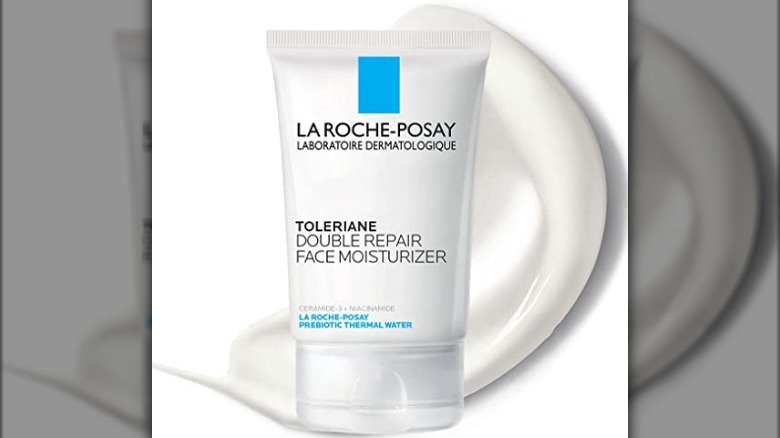What It Means To Treat Your Skin Like A Houseplant
We may receive a commission on purchases made from links.
Like plants, humans are mostly water — about 60%, to be exact (via USGS). We're not all that dissimilar from the flora blooming in our front yards either. According to The DNA Tests, humans share 25% of our DNA with daffodils and a staggering 50% with trees. As is true for all living species on earth, water is a crucial element of survival.
When we're dehydrated, the negative effects are evident on our skin. Shadows pop up under the eyes, cheeks lose their luster, and creases become more pronounced, among other things, per Healthline. Although it's often confused with dehydrated skin, dry skin is something else entirely, typically a result of climate or a preexisting condition which may cause you to experience itchiness, roughness, and redness.
"The worst areas are typically near the eyebrows and around the corners of the nose and mouth," board-certified dermatologist Ross C. Radusky warns Allure. Just as soil cracks in dry weather, so too does skin. For starters, Harvard Health recommends reintroducing healthy oils with the help of unscented moisturizers and gentle cleansers. And, just as you regularly water a favorite houseplant, it's important to hydrate your skin too.
Replace your harsh products with gentler ones
Dermatologist Dr. Hamza D. Bhatti, DO, FAAD has a creative suggestion for those suffering from dryness and dehydration: Think of your skin as a houseplant. In this case, your daily moisturizing routine is a stand-in for a watering can. As Dr. Bhatti explained to Refinery29, "When you're watering the plant, the leaves are nice and soft, everything is great. But if you stop watering the plant, or the heat is turned up in the house and it becomes too dry and there's not enough humidity, the leaves turn hard and they crack and become brittle."
The same is true for your skin: "If you keep the barrier controlled, [and] hydrated, it's going to feel like that smooth, soft leaf." Going overboard with exfoliation, employing too many harsh retinoids, and regularly using salicylic acid-based cleansers can damage your skin's barrier. To rehydrate, you'll need to cool it on your bad habits and stock up on a few necessities — first and foremost, the right kind of moisturizer.
TikTok creator and dermatologist Dr. Daniel Sugai, MD, FAAD, recommends CeraVe's moisturizing cream, which is available everywhere from your local drugstore to Amazon. As he notes, applying the product right after a shower will seal in moisture. Alternatively, Byrdie suggests the super-viral Laroche-Posay Double Repair Face Moisturizer for acne-prone skin. Much like with a houseplant, regular "watering" is key. Always use moisturizer in the mornings, before applying foundation, and again each night before bed.
Give your skin plenty of nutrients
As noted by dermatologist Dr. Michelle Henry, MD, FAAD, colloidal oatmeal should also be added to your skincare routine immediately if you're concerned about dryness — think of it as a fertilizer. As she informed Refinery29, "When you grind [oats] into a liquid, you get an anti-inflammatory, and it contains phenols that help make it an antioxidant and it creates this invisible that's helping strengthen and fortify that barrier."
For starters, check out Aveeno's Calm + Restore Triple Oat Serum and see if it makes a difference. Just as the added nutrients in composted soil help plants to grow more abundantly, certain foods benefit your skin too. For instance, Omega-3 fatty acids, a component common in fish and certain kinds of seeds, aid in collagen production.
Elsewhere, fruits and vegetables rich in vitamin C can help reduce the appearance of wrinkles (via Cleveland Clinic). As registered dietitian Nicole Hopsecger, RD, put it, "The best way to nurture your skin is by eating a diet filled with plant-based foods and reducing the amount of processed foods and alcohol."
Don't forget to drink lots of water too
Exposing your skin directly to water — by sitting in a hot tub, taking long showers, etc. — can lead to a dry, cracked appearance. Rather, it's important to hydrate your skin by drinking water, and lots of it. In the words of Yale Medicine's director of aesthetic dermatology, Kathleen C. Suozzi, MD, "Skin hydration is a reflection of total-body hydration," (via Everyday Health). She added, "If a person is dehydrated, there is less water being transferred to the skin from the circulation."
Although a glass of water isn't a one-stop fix-all solution, it is a key element of a healthy skincare routine. "The truth is that when you drink water, it doesn't automatically go to the skin — it hydrates cells once absorbed into the bloodstream and filtered by the kidneys," board-certified dermatologist Margarita Lolis, MD, clarified to Byrdie. "So, at the cellular level, drinking water is great as it flushes the system and hydrates our bodies overall."
The Institute of Medicine of the National Academies advises that adult women should consume 11 cups of water each day, per Forbes Health. Of course, numbers vary depending on your activity level and the climate of your environment since, just as plants need more water in the heat, so too do humans (via Verywell Fit).



